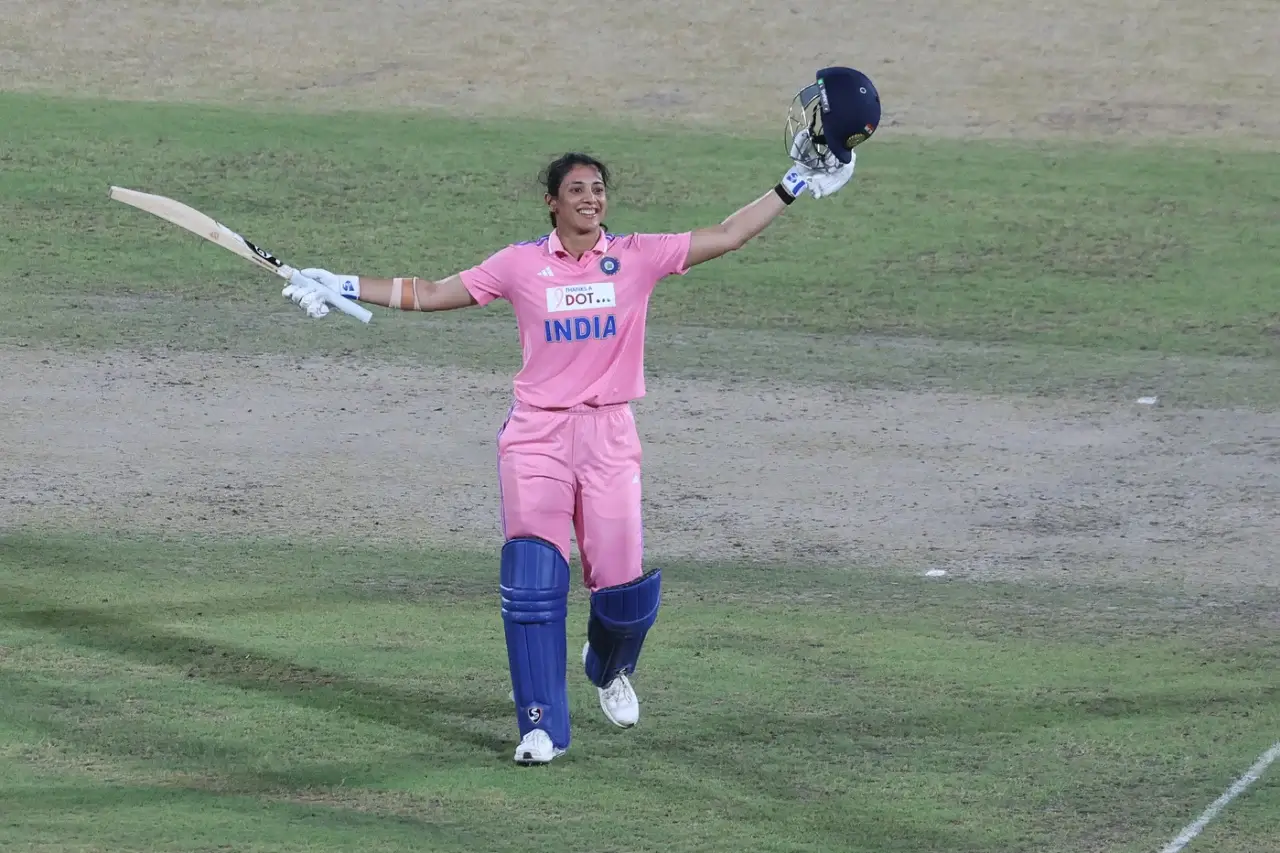Smriti Mandhana has taken full responsibility for India’s heartbreaking defeat to England in the Women’s World Cup 2025. Chasing 289, India looked comfortable until another collapse derailed their campaign. Mandhana’s dismissal for 88 became the turning point, as India fell short by just four runs in Indore.
Mandhana’s admission was refreshingly honest. She said “emotions took over” when she played a risky aerial shot against Linsey Smith. From needing a run-a-ball 57 with seven wickets in hand, India stumbled to 262 for six. England’s spinners, Sophie Ecclestone and Smith, bowled six of the last nine overs and choked India’s chase.
The left-hander’s candid reflection revealed India’s struggle with pressure moments, a recurring theme this World Cup. While the team has shown skill and structure, composure remains its biggest weakness. Mandhana admitted she should have been patient and taken the game deeper instead of forcing the pace to maintain the timeline.
Despite the disappointment, Mandhana praised Deepti Sharma and Richa Ghosh for their fight. But she was clear — the collapse began with her. As India faces a must-win clash against New Zealand, this defeat could be the lesson they needed to finally fix their mental lapses.
Mandhana’s Honest Reflection on Pressure and Patience
Smriti Mandhana’s press conference after the loss was a mix of regret and self-awareness. Her tone was calm but firm — she owned the mistake without hesitation. She admitted that “the emotions took over” when she tried to lift Smith over covers, despite telling herself to stay grounded.
Mandhana’s wicket triggered a chain reaction. India, at 232 for three, collapsed under England’s clever spin choke. Within a few overs, Richa Ghosh and Deepti Sharma were dismissed while trying to force shots. Mandhana said she felt confident when she walked back, but hindsight showed how crucial her dismissal was.
Her honesty struck a chord with fans. Rarely does a senior player take such accountability in public. Mandhana didn’t shy away from admitting that patience was missing — not just from her, but across the lineup. She said India needed to “take the game deeper” instead of rushing under pressure.
Her statement reflected maturity but also highlighted India’s mental barrier. The pattern of crumbling in tight chases continues. Mandhana’s words are now both a confession and a call to change — India’s stars must manage pressure like champions, not victims.
Inside the Collapse — How England Outthought India
England read the game better in the final stretch. Their left-arm duo, Ecclestone and Smith, controlled length and tempo perfectly. They didn’t allow India to free their arms or rotate strike easily.
Mandhana’s attempt to hit against the drift backfired, opening the door for England. From that moment, India’s approach became desperate instead of calculated. Richa Ghosh chipped one to cover, and Deepti Sharma fell trying to slog.
Mandhana accepted that it wasn’t about skill. It was about decision-making under stress. When India panicked, England stayed calm. That was the difference between victory and heartbreak.
Dropping Rodrigues — A Risk That Backfired
Before the match, India made a surprise change. Jemimah Rodrigues was dropped for pacer Renuka Singh to strengthen the bowling. Mandhana defended the decision but admitted it was a tough call.
India’s logic was sound — in previous matches, their five-bowler setup left them vulnerable. Against England, they wanted an extra option in case one bowler struggled. Renuka justified her inclusion, conceding only 37 from eight overs. The bowlers restricted England to 288 when 300 looked likely.
But that meant India’s batting depth suffered. When Mandhana fell, the middle order looked thin. Without Rodrigues, the team lacked one stabilizing batter for the final stretch. Mandhana said it’s not a permanent change, emphasizing flexibility based on pitch and match situation.
Her words showed that India is still searching for the right team balance. They have the talent, but not the settled structure. As the World Cup pressure mounts, finding that balance could decide whether India makes the semi-finals or fades again.
India’s Bowling Bright Spot — Deepti’s 150th Wicket
One of the few positives from Indore was Deepti Sharma’s spell. Her 4 for 51 kept India alive when England were pushing for 300. With her 150th ODI wicket, Deepti became only the second Indian woman to reach that milestone after Jhulan Goswami.
Mandhana praised Deepti’s game awareness and consistency. She called her “the team’s engine,” capable of turning matches with both bat and ball. In a game filled with emotional errors, Deepti’s control stood out.
Her performance reminded everyone that India still have match-winners who thrive under pressure. If more players can match that composure, India can recover quickly in the tournament.
Lessons and Road Ahead — India’s Final Wake-Up Call
India’s defeat wasn’t just another lost chase — it was a mental mirror. It exposed the psychological cracks that continue to haunt them. Mandhana’s honesty may help the team confront that truth and rebuild confidence before the New Zealand match.
Coach Amol Muzumdar’s challenge now is to turn introspection into improvement. The team must learn to slow the game down under pressure. A six-run-per-over chase isn’t difficult — but it becomes hard when emotions rush decisions. India needs to rediscover calmness in tense overs.
This loss can either break their rhythm or ignite their resolve. The next few matches will reveal which way they turn. The players know the patterns — now they must prove they can break them.
If they can handle pressure better, DY Patil Stadium could host India’s redemption. If not, Indore will join the growing list of heartbreaks.
The Redemption Chance Against New Zealand
India’s next match against New Zealand is more than a group-stage game. It’s a mental test. The DY Patil pitch will suit their batters, but only if composure holds.
Smriti Mandhana, Harmanpreet Kaur, and Deepti Sharma will need to anchor the chase smartly. The team can’t afford another emotional slip. With semi-final hopes at stake, this is where belief must replace fear.
Fans have seen India dominate early but falter late. Mandhana’s admission might finally trigger the mindset shift the team desperately needs.
Conclusion
Smriti Mandhana’s post-match admission summed up everything India is going through — talent without closure. Her shot wasn’t reckless; it was emotional. That one moment captured India’s biggest weakness — losing its cool under pressure.
Her willingness to take responsibility marks growth. For years, Indian cricket has struggled to admit emotional errors publicly. Mandhana’s honesty might be the first step toward fixing that. The defeat to England hurt, but it also revealed where India must improve most — in the mind.
The bowling, led by Deepti Sharma, gave India every chance. But pressure has no mercy on hesitation. Every game from here is a mental battle first, technical second. The next test against New Zealand offers redemption — and a chance to show that lessons have truly sunk in.
If India play with patience, not panic, they can still make the semi-finals. And if Mandhana’s words translate into action, Indore could become the turning point of this World Cup.
One composed innings can change the entire story. This team just needs to believe that the next time emotions rise, discipline must win.







